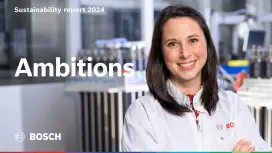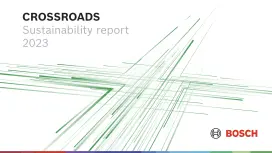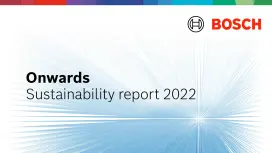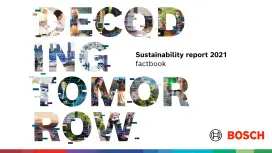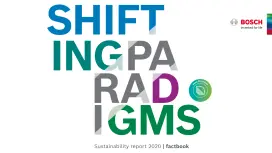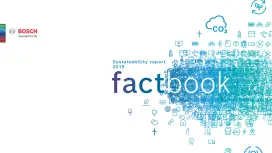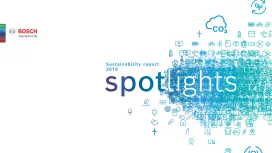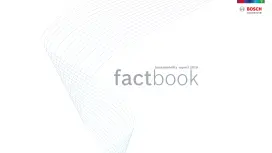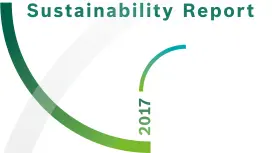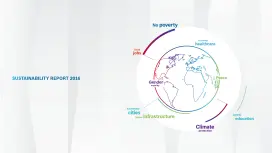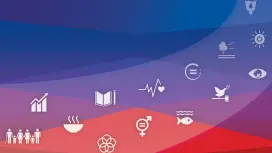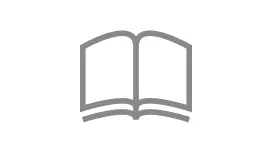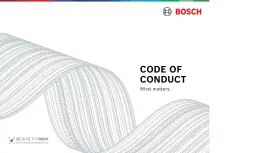Transparent reporting
Sustainability figures of the Bosch Group
Frequently asked questions
To us, sustainability means striking a balance between the economic, environmental, and social dimensions of our business activities as part of responsible corporate governance. In this section, you will find answers to frequently asked questions about our commitment.
There’s plenty of support for professional and personal development during work hours and a vast range of free and company-funded training courses available to everybody. Learning anytime, anywhere is supported with our free licences for online courses from world-renowned institutions.
In 2024, Bosch invested 252 million euros in training for its associates. Our associates attended a total of 729,679 training days in 2024 in the form of seminars and webinars. All employees have access to training and are included in the evaluation of training hours and expenditure, including full-time, part-time, temporary workers and contractors.
A wide range of roles, teams, and projects enable career development in various functional areas, locations, and countries. No matter which path our associates choose, we support them to achieve their career goals — for example with annual development dialogues and qualification programs.
The Bosch Talent Pool (TP) is a structured global pool designed to support the development and mobility of associates with potential for increased scope and responsibility. Through a defined process, including nominations by managers, HR business partners or self-nomination, the future members are selected (both full-time and part-time associates). Our respective Talent Development Programs (TDP) are designed to accelerate career progression and prepare the selected associates within approximately three years. The program provides structured training, networking, career plans and mentoring. Associates showing enhanced potential for executive positions are supported by an additional fast track program. Our commitment extends across all business areas.
Furthermore, it is paramount for us to recruit, develop and retain young talents for both specialist and leadership career trajectories. Therefore, the Graduate Specialist Program (GSP) and Junior Managers Program (JMP) are specifically designed as entry programs to cultivate and enable these target groups.
The ‘Bosch Pulse Check,’ our annual global full employee survey, is a central element of our feedback landscape, highlighting our corporate culture. Guided by our slogan ‘Invented for life,’ our objective is to foster an employee-centric performance culture where the satisfaction and engagement of our associates, responsible actions and the long-term economic success of our company are in harmony.
The results of the survey are systematically analyzed at both global and local levels and are used to identify strengths and areas for improvement. Based on the findings, managers and their teams develop and implement targeted action plans to address key engagement drivers, such as leadership, collaboration, and development opportunities.
The results from our latest survey show us where we stand: Our Engagement Score for the 2025 survey is 67%. The insights gained from the survey inform ongoing people and leadership initiatives and are integrated into continuous improvement processes aimed at strengthening employee engagement over time. Follow-up actions are monitored through subsequent survey cycles.
We use various training and communication measures to raise our associates’ awareness of compliance. The compliance training program is available to our associates in the form of web-based training (WBT), in-person events or webinars as well as corresponding documentation. Participation in the basic business ethics training on the Code of Conduct is mandatory for all associates worldwide, full-time as well as part-time employees, including leasing workers/subcontracted workers, seasonal and temporary employees, white- and blue-collar employees*. It includes introductions in major compliance areas such as anti-corruption, competition and antitrust law, anti-money laundering, or taxes and export control.
Further additional compliance training measures, focusing on specific compliance areas and the respective risks, are mandatory for certain target groups, who are defined based on a risk-based approach. These additional trainings complement, but do not replace, the mandatory ethics training applicable to all employees and contractors.
The training content must be repeated regularly, usually every two to three years. Our training programs are regularly refined and updated to accommodate new content and developments, as well as feedback from participants.
* Shop floor associates without access to the training IT system are required to at least consume three videos with the most relevant information on the Code of Conduct, the Bosch values, and how to speak up with concerns.
Corporate Internal Audit executes a multi-year audit plan to assess the adequacy and effectiveness of all CMS areas and elements (e.g., Anti-Corruption, Anti-Trust, Anti-Money Laundering, Whistleblowing System, and Third-Party Compliance). This comprehensive approach is guided by our overarching ‘Bosch Corporate Group CMS’ directive and the globally recognized IDW PS 980 standard. In addition, the audit activities are aligned with the Compliance Committee’s maturity assessment. This assessment establishes a standardized framework to evaluate the maturity of individual CMS elements, effectively identifying areas for improvement and development. By aligning the audit activities with the maturity assessment, Bosch gains a comprehensive view into the adequacy and effectiveness of its CMS.
Bosch products aim to impress thanks to their safety, quality, and reliability — regardless of where they are produced or used. In developing and manufacturing these products and in rendering services, we stay true to our 'Invented for Life' mission statement beyond compliance with the law.
Due to the wide-ranging product portfolio, Bosch applies a large number of different quality laws and regulations worldwide. All Bosch production sites have a quality management system certified according to ISO 9001. In addition to the ISO 9001 certification, all sites that manufacture vehicle components are certified according to the IATF 16949 standard, which is based on ISO 9001 and was developed by the International Automotive Task Force (IATF).
Products are not released for series production until all safety aspects have been clarified. In addition, compliance with pertinent specifications are established and verified accordingly for all products, for example through precautionary tests (end of line testing, reliability testing, product audit, among others). We perform product monitoring to the required extent throughout the entire product life cycle of safety-relevant products and we have corporate directives to handle customer complaints and field incidents.
Comprehensive training establishes the preconditions for ensuring that everyone in the company is committed to, and puts into practice, Bosch’s quality standards — especially with regard to the provision of safe products. Bosch provides mandatory product quality training to all relevant workforce types across the organization. Product quality and quality compliance trainings are conducted annually and are designed to ensure consistent application of Bosch’s quality and product safety standards. These trainings apply to all employees worldwide, including full-time, part-time, temporary and fixed-term employees. In addition, contractors and leased workers whose activities may influence product quality or product safety are also required to complete relevant product quality trainings.
The ‘Quality Management Curriculum’ is assigned annually to all associates in relevant roles. The curricula encompass both the globally applicable corporate standard on quality fundamentals and tailored content addressing the needs of local workforce at the various sites, depending on their tasks and manufactured products.
At Bosch, we enable our suppliers, contractors and their sub-contractors to meet our high quality standards by providing clear guidance and training. Training activities on quality assurance considers an as-needed basis as part of our supplier quality management approach and are conducted when new projects start, product specifications change, or quality deviations are identified. Our programs focus on strategically relevant suppliers, new partners, contractors and their sub-contractors and those operating in critical product areas, with mandatory participation for suppliers classified as high risk. Training examples include 'Failure Mode and Effect Analysis' (FMEA) and 'Electrostatic Discharge' (ESD).
Bosch has implemented a comprehensive and group-wide system for supply chain risk and resilience management to generally facilitate product availability. This system is anchored in the corporate directive 'Supply Chain Risk and Resilience Management', which defines both preventive and reactive measures and is binding across the Bosch Corporate Group. It includes supplier screening, risk classification, and mitigation strategies (e.g. dual sourcing, safety stock planning, and the use of alternative production sites for certain products). In addition, early warning mechanisms, task force procedures, and crisis management processes are also included in corporate directives.
